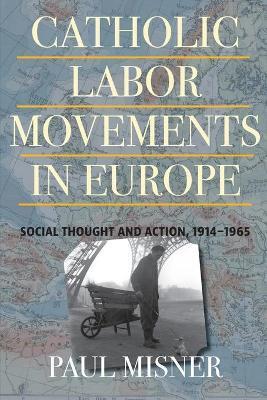Catholic Labor Movements in Europe: Social Thought and Action, 1914-1965

Catholic Labor Movements in Europe: Social Thought and Action, 1914-1965
Catholic Labor Movements in Europe narrates the history of industrial labor movements of Catholic inspiration in the period from the onset of World War I to the reconstruction after World War II. The stated goal of concerned Catholics in the 1920s and 1930s was to "rechristianize society." But dominant labor movements in many countries during this period consisted of socialist elements that viewed religion as an obstacle to social progress. It was a daunting challenge to build robust organizations of Catholics who identified themselves with the working classes and their struggles. Only one of the many worker advocates whose story makes up the meat of this book attained international recognition in the Catholic world. That was the founder of the JOC (Jeunesse Ouvriere Chretienne), Jozef Cardinal Cardijn. But the combined efforts of those involved in the Catholic labor movements, despite the inevitable infighting, persisted through generations marked by Fascist and Nazi domination, by the Great Depression, the Second World War and the Cold War. The protagonists and historians of these movements documented their struggles, and Misner now synthesizes this wealth of information, presented country by country, and interprets the development of labor movements across Europe. A comprehensive bibliography of sources adds greatly to the volume, enhancing its value as a reference. In combination with other factors, such as the American Marshall Plan which fueled the "economic miracle" of the 1950s, Christian labor unions contributed their part to the distinctive "social capitalism" of Europe. The basic commitment to democratic rule, combined with the fading of the anti-religious ideology of the social democratic unions and parties, encouraged a merging of the rival union confederations in the countries of the European Community. With its unique resources and heritage, and now in a pluralistic setting, Christian labor strengthened the shared call for social justice and the common good.
PRP: 356.49 Lei
Acesta este Pretul Recomandat de Producator. Pretul de vanzare al produsului este afisat mai jos.
320.84Lei
320.84Lei
356.49 LeiLivrare in 2-4 saptamani
Descrierea produsului
Catholic Labor Movements in Europe narrates the history of industrial labor movements of Catholic inspiration in the period from the onset of World War I to the reconstruction after World War II. The stated goal of concerned Catholics in the 1920s and 1930s was to "rechristianize society." But dominant labor movements in many countries during this period consisted of socialist elements that viewed religion as an obstacle to social progress. It was a daunting challenge to build robust organizations of Catholics who identified themselves with the working classes and their struggles. Only one of the many worker advocates whose story makes up the meat of this book attained international recognition in the Catholic world. That was the founder of the JOC (Jeunesse Ouvriere Chretienne), Jozef Cardinal Cardijn. But the combined efforts of those involved in the Catholic labor movements, despite the inevitable infighting, persisted through generations marked by Fascist and Nazi domination, by the Great Depression, the Second World War and the Cold War. The protagonists and historians of these movements documented their struggles, and Misner now synthesizes this wealth of information, presented country by country, and interprets the development of labor movements across Europe. A comprehensive bibliography of sources adds greatly to the volume, enhancing its value as a reference. In combination with other factors, such as the American Marshall Plan which fueled the "economic miracle" of the 1950s, Christian labor unions contributed their part to the distinctive "social capitalism" of Europe. The basic commitment to democratic rule, combined with the fading of the anti-religious ideology of the social democratic unions and parties, encouraged a merging of the rival union confederations in the countries of the European Community. With its unique resources and heritage, and now in a pluralistic setting, Christian labor strengthened the shared call for social justice and the common good.
Detaliile produsului








